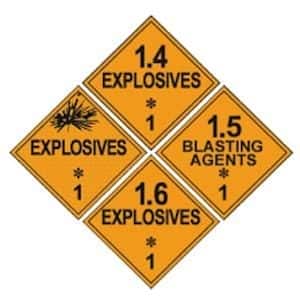Michigan Truck Accident Lawyers Fighting For The Injured
Hazmat trucks carry dangerous and toxic substances, and if one spills on the roadway or released into the air, it spells catastrophe for nearby businesses and residents.
A truck accident almost always results in serious or life-threatening injuries. Because a semi-truck can weigh between 30,000 pounds and 80,000 pounds, people in cars which typically weigh 3,000 to 4000 pounds are often severely injured or killed when involved in a truck accident.
But even worse than your run of the mill truck accident, the worst ones are those involving trucks carrying hazardous material — also referred to as hazmat trucks.
We can think of several reasons why a hazmat truck accident is more dangerous than other kinds of big rig truck accidents.
- A hazmat truck might be carrying gasoline or another flammable liquid that, if spilled, makes the road treacherous. Your hazmat accident can happen in a split second. If one car crashes with a tanker truck and the substance spills, the other vehicle driver coming into contact with the slippery spill on the roadway can lose control of their vehicles. This dangerous condition increases the risk of chain reaction accident.
- In most case, solid goods being transported by truck are even disturbed and tightly strapped on the trailer. Even if a semi-tractor trailer needs to make a sudden maneuver, the cargo should stay securely positioned if they were properly loaded, unless the cargo shifts. But bulk tank filled with liquid, that liquid will slosh around back and forth and may destabilize the truck because the center of gravity has shifted. Unstable tanker liquid can make it more likely to be involved in a rollover or jackknife accident.
- Exposure to toxins often results in injury that doesn’t show symptoms immediately. If you’ve been in a truck accident, you’re probably first evaluating visible injury to yourself and your passengers. But if a toxic gas is released into the air, it can be extremely dangerous because you can’t see it.
What types of materials are transported by hazmat trucks?
A tractor trailer is a truck that hauls items like equipment, furniture, grocery products, construction materials, or any other solid goods. If the cargo on the freight trailer is properly loaded and secured, it should be stable within the trailer. For example, if an 18-wheeler truck and flatbed trailer have an accident and its cargo falls on the roadway, it may cause a mess to clean up, but it’s not going to become airborne to cause harm from exposure to fumes or other toxins. A hazmat truck, or tanker, on the other hand, carries liquid or gas cargo, or flammable or explosive solids.
The Federal Motor Carrier Safety Administration (FMCSA) sets forth 9 classes of hazardous materials. The regulations require this class of cargo to be labeled by a visor card for identification on all four sides of the vehicle transporting the substance:
Class 1: Explosives
This class includes anything that could create an explosion, become projectiles, blasting agents, or detonating devices.
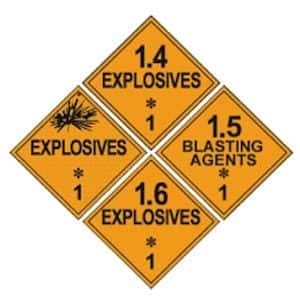
Class 2: Gases
In this class, flammable and non-flammable compressed gas, including toxic gases are included within this category.
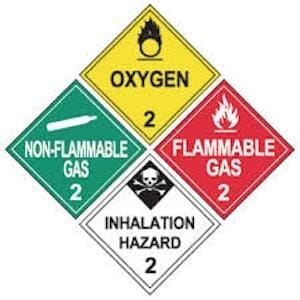
Class 3: Flammable liquid
A flammable liquid could be gasoline, diesel or jet fuel, motor oil, kerosene, ethanol, and others.
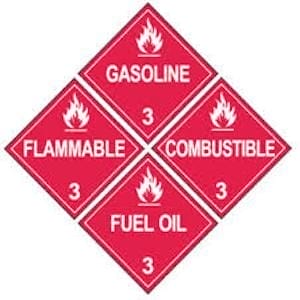
Class 4: Flammable solids and spontaneously combustible materials.
In this class, flammable solids, and such substances capable of spontaneous combustion such as activated charcoal, aluminum powder, and magnesium are considered flammable solids, along with other household goods like sulfur.
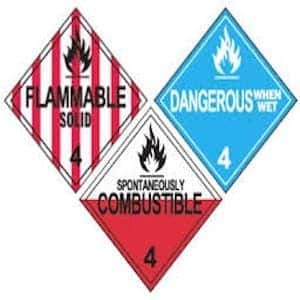
Class 5: Oxidizers and organic peroxides
These chemical compounds enhance the burning of other materials.
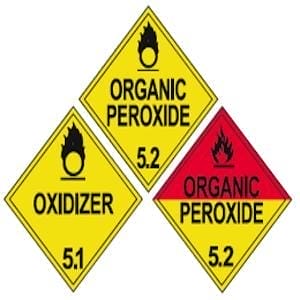
Class 6: Toxic materials and infectious substances
Rat poison, for example, is toxic but not a gas or liquid. This class also includes infectious biological materials. An infectious biological substance is any pathogen that could cause disability or death if a human or animal is exposed.
The most dangerous infectious substances for humans are Bacillus anthracis (anthrax), Escherichia coli (verotoxigenic), Hepatitis B virus, Marburg virus, and Mycobacterium tuberculosis. For animals, the most dangerous are African swine fever virus, foot and mouth disease virus, and Sheep-pox virus.
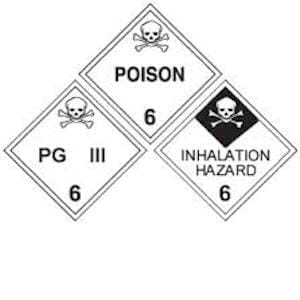
Class 7: Radioactive materials
A radioactive spill could affect the environment and nearby residents for years, decades, or centuries. The regulations require any radioactive material have special handling and management.
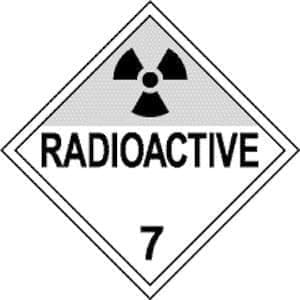
Class 8: Corrosive materials
This class includes strong acid or base materials that can quickly burn and corrode.
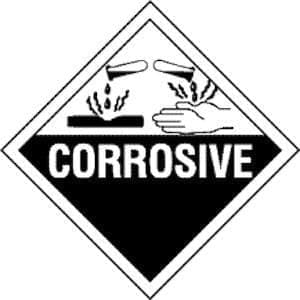
Class 9: Miscellaneous
This is a catch-all for any substance that’s hazardous but doesn’t fall into any of the other categories. Lithium batteries are one example. Chances are you have lithium batteries in your home — they’re commonly found in mobile phones, cameras, and other consumer electronics. When handled correctly, they’re not a hazard. They generate a large amount of energy and are highly flammable and explosive under certain conditions.
When dry ice forms carbon dioxide gas, it can lower the percentage of oxygen in the air. That’s why, in some circumstances, it could actually cause a person to asphyxiate.
Trucking companies need to follow very specific federal regulations when hauling hazardous cargo. These hazardous material handling guidelines are designed to ensure that the cargo will remain safe, even in the event of an accident. However, there are various types of truck accidents, and no amount of safety planning can account for every situation.
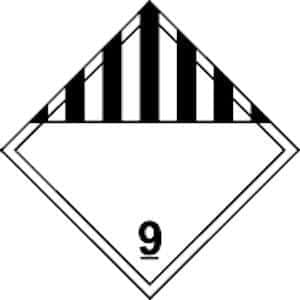
Common injuries caused by hazmat truck accidents
Truck accident injuries can be severe and life-changing. Many accidents between a passenger car and a big rig result in harm that includes traumatic brain injury, spinal cord injury, sciatica, burns, amputation, broken bones and a range of other medical conditions. When an accident involves a hazmat truck, the injuries might be completely different.
Truck Accident Fire or explosion hazard
Substances like gasoline and propane can ignite and cause an explosion or fire that causes burns or fatalities. Not only does this fiery substance affect the occupants of the vehicles directly involved in the tanker crash, but it can also harm other people anywhere in the vicinity of the fire or explosion area, along with the first responders who come to the scene.
A burn injury caused by touching something hot could be mild and contained to the skin. But a burn injury from an explosion or vehicle fire is more likely to be a 3rd degree burn, or one that leads to permanent disfigurement or death.
Next time you’re on the highway, look closely at the big rigs and trailers you see. You may notice many 18 wheel tanker trucks have pipes underneath or on the sides of the trucks. These are known as wet lines. A wet line is the pipe used to load the fuel on and off the truck. The wet lines can hold 30 to 50 gallons of fuel when the truck is in motion.
These wet lines are on the exterior of the vehicle, which means that in the event of a collision, there’s a good chance that a car can hit a wet line. If the wet lines are hit in tanker crash, the gas can spill onto the road and onto other vehicles nearby. Gas on pavement is slippery and can melt the pavement. If gas spills suddenly on the roadway, vehicles can easily lose control. The other cars around you can also lose control, which could cause a multi-vehicle pileup crash commonly known as a chain reaction accident.
If 50 gallons of gasoline spill onto the road, it can create a fire of up to 5,000 square feet. In other words, the “leftover” gas contained only in that wet line on the side of a truck could cause a devastating fire with millions of dollars in damages, severe injuries, or fatalities.
Truck Accident Airborne Chemical Substance
One of the primary dangers related to tanker accidents with gas toxins is that once it’s in the air, it can’t be contained. Depending on the force and direction of wind and weather conditions, a chemical fume can travel miles from the accident crash site.
If you are exposed to toxic gas or liquid, it can lead to temporary irritation to the skin and eyes. You may also have long-term and untreatable respiratory and neurological damage. Depending on the type of chemical, gas, liquid, and the saturation in the air, and weather conditions, it could affect many people in close proximity, or even people in their business and home’s miles away.
Getting help after a truck accident
You should always get examined by a medical professional first. Whether you were injured in a truck accident or you lost a loved one, The Joseph Dedvukaj Firm is available 24/7. A car accident with a truck can be complicated. When you’re in a collision with another passenger car, there’s usually only your insurance company and the other driver’s insurance company involved, and the claim can often be resolved quickly.
In a truck accident, however, there are several parties. Even if you were partially at fault for the crash, others may be partly to blame such as the driver, the trucking company, a manufacturer of truck parts, or the shipper of the hazardous materials. It doesn’t have to be your job to figure out who’s who and how they contributed to the accident. Leave this up to your truck accident lawyer.
A truck accident lawyer will do several things:
- Review the police report investigation with you
- Investigate and gather evidence
- Present you tanker truck claim and negotiate on your behalf with the insurance companies to reach the best possible settlement.
- Establish liability of all parties involved and maximize the amount which you receive.
- File a personal injury or wrongful death lawsuit if the insurance companies refuse to pay you a fair settlement.
WARNING: IN A CATASTROPHIC TRUCK ACCIDENT, THE TRUCKING COMPANY MIGHT NOT HAVE ENOUGH TRUCK INSURANCE COVERAGE FOR THE NATURE AND EXTENT OF YOUR DAMAGES, ESPECIALLY IF MULTIPLE PEOPLE WERE SEVERELY INJURED OR KILLED. THAT’S WHY YOU NEED A LAWYER TO GET TO WORK FAST TO FIGHT FOR WHAT YOU DESERVE BEFORE THE INSURANCE POLICY LIMITS ARE EXHAUSTED.
SEMI TRUCK ACCIDENT LAWYERS IN MICHIGAN
While truck accidents are much more complex than an accident between two passenger vehicles, when the truck is carrying hazardous materials, the accident has the potential to be even more complicated. According to the Department of Transportation, large commercial trucks transport nearly three billion tons of hazardous materials each year, and these hazardous materials can cause serious, even fatal injuries to those involved in the accident, and those who were close to the scene of the accident.
WHAT IS THE DIFFERENCE BETWEEN TANKER TRAILER AND “REGULAR” TRAILER?
Regular trucks generally carry dry goods. A tank truck, depicted above, is a fuel truck, gas truck or tanker truck motor vehicle capable of carrying liquids or gases on roads and highways. Tanker trailer is basically a tank on wheels which may carry gases and liquids such as milk, gas, oil, and chemicals. Generally, tankers are the type of vessel or trailer which also carries hazardous cargo.
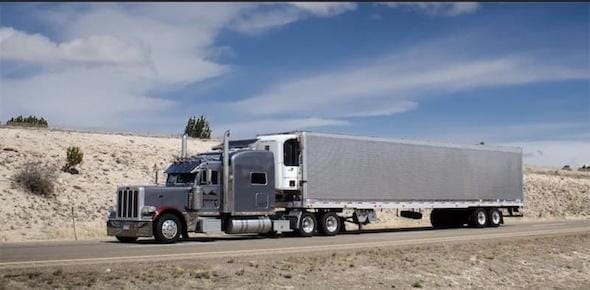
A tractor trailer’s cargo, depicted here, is not considered as dangerous to transport if the cargo is properly secured. Regular tractor trailers typically carry such things as freight, furniture, lumber, groceries, equipment, packages and building materials. A tanker truck may transport bulk liquids which can be in the form of gas, oil, or corrosive chemicals. The liquid contents of a tanker truck may slosh around in the tank from side to side, causing a dangerous shifting cargo condition where the center of gravity of the truck is affected, which then makes it difficult for the driver to maintain control of the tractor-tanker combination. If hazardous materials are spilled during an accident, there could be toxic fumes or dangerous gases, corrosive chemicals hazmat specialists to manage.
WHAT MAKES TANKER TRUCK ACCIDENTS DIFFERENT FROM OTHER TRUCK ACCIDENTS?
We know from experience that toxic chemicals, gasoline, or oil can be ignited during a tanker truck accident, or noxious fumes can spill into the air when the tanker is compromised. While injuries from any 18-wheeler accident can be catastrophic, having toxic chemicals involved in the accident adds another layer of potential injury. The victims of the hazardous materials truck accident could sustain permanent injuries which prevent them from returning to work, or to the life they had prior to the accident.
WHAT TYPES OF INJURIES OCCUR FROM TRUCK ACCIDENTS WITH HAZARDOUS CARGO?
Often truck accident victims come into contact with hazardous chemicals in the crash, which can result in serious skin burns, organ damage, blindness and even death. Tanker truck hazardous material may cause these types of injuries from which the victim may never recover. Severe chemical burns can cause permanent and serious scarring disfigurement as well as many other many other health conditions that can affect your ability to lead a normal life.
DO HAZARDOUS CARGO ACCIDENTS HAVE SPECIAL ASPECTS?
The liquids and chemicals that are being tanker transported are usually oil-based. This means they are slippery and when spilled over a roadway, can cause a loss of traction for other cars or trucks using the roadway, leading to additional crash accidents. Other vehicles may crash into the disabled tanker, or into other vehicles because they unable to brake, slow or stop, because of the friction with the surface of the road has been severely reduced.
ARE TRUCK ACCIDENTS INVOLVING HAZARDOUS MATERIALS REGULATED?
Companies who transport hazardous materials in tanker trucks across the United States must comply with both state and federal laws. There are generally restrictions on which road and highways hazardous materials can be transported on, and some materials may not be transported in specific areas due to the density of the population. Hazardous materials can also have transport restrictions on the time of day or day of the week, and drivers who transport hazardous materials must have a valid commercial driver license, and extra education, training, and safety certification. States are allowed to have even stricter regulations regarding hazardous cargo. The standard set by the Federal Motor Carrier Safety Administration is the minimum standard. As an example, the State of Michigan does not allow truck drivers to obtain a hazardous materials endorsement until the truck driver has completed the proper training and testing.
WHAT INSURANCE COVERAGE DO HAZARDOUS MATERIAL TANKERS CARRY?
Because there is significant danger and risk involved in the transportion of hazardous cargo, the trucking companies who transport this cargo must have additional insurance coverage. Sometimes FMCSR regs required as much as $5 million as a minimum insurance coverage amount. Generally, hazardous cargo tankers have higher insurance coverage limits, but they are usually also vigorously defended, meaning while there should be plenty of insurance to covering your claim, there is also unlimited resources to defend against claimants seeking financial compensation.
HOW DO I GET COMPENSATION FOR A TRUCK ACCIDENT INVOLVING HAZARDOUS MATERIALS?
Undoubtably, a trucking company has an army of attorneys on their side to limit their liability for your claim. Because of this, it is imperative that you have an aggressive, experienced Detroit Michigan truck accident attorney from The Joseph Dedvukaj Firm to hold the negligent party accountable. Many of these trucking companies take a risk in transporting hazardous materials. However, you should not suffer from their mistakes or negligence. The Joseph Dedvukaj Firm Michigan lawyers have successfully handled uncooperative trucking industry insurance companies and will work hard to ensure your medical expenses, wage loss and pain and suffering are fully and fairly compensated.
Call today at 248-352-2110 or toll free 866-HIRE-JOE for a 100% free consultation. Better Business Bureau A+ rated law firm.


